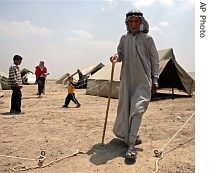2007年VOA标准英语-Iraqi Homeless Setting Up Ad Hoc Displacement C(在线收听)
Geneva
15 June 2007
U.N. refugee agency (UNHCR) officials say camps for internally displaced people are beginning to sprout up across Iraq. This is happening, officials say, because communities in the country are closing their doors to the displaced. Lisa Schlein reports for VOA from UNHCR headquarters in Geneva.
 |
| Iraqis move between tents erected for displaced residents of the violent Diyala province, northeast of Baghdad, 15 May 2007 |
The coordinator for the UNHCR's Iraq support unit, Andrew Harper, says he fears the recent bombing of the minarets on the Samarra shrine might trigger another wave of displacement within the country.
He says these people will have a difficult time finding a safe haven as more and more communities are no longer accepting newcomers. The internally displaced are so desperate, Harper says, that they are creating their own camps.
"This is something which we knew would eventually come, but, we had tried to assist those communities, host communities absorb these people without the establishment of camps because camps are probably one of the worst things you can have," he noted.
Harper says these ad hoc camps are like slums and do not have proper provisions for sewage, shelter or security. He describes one such camp in the city of Najaf, about 160 kilometers south of Baghdad.
"Women going to the toilet in their tent or their huts, because they cannot go out…they cannot leave their huts. They are not registered for food. There certainly is no electricity. It is 50 degrees heat. The children are not going to go to school. Security is okay at the moment. There obviously is no employment possibilities there. And the most we can provide is some tents and some buckets and some non-food items," he explained.
U.N. coordinator Harper says so far there are only about 10 of these camps, but he expects to see many more springing up in the future.